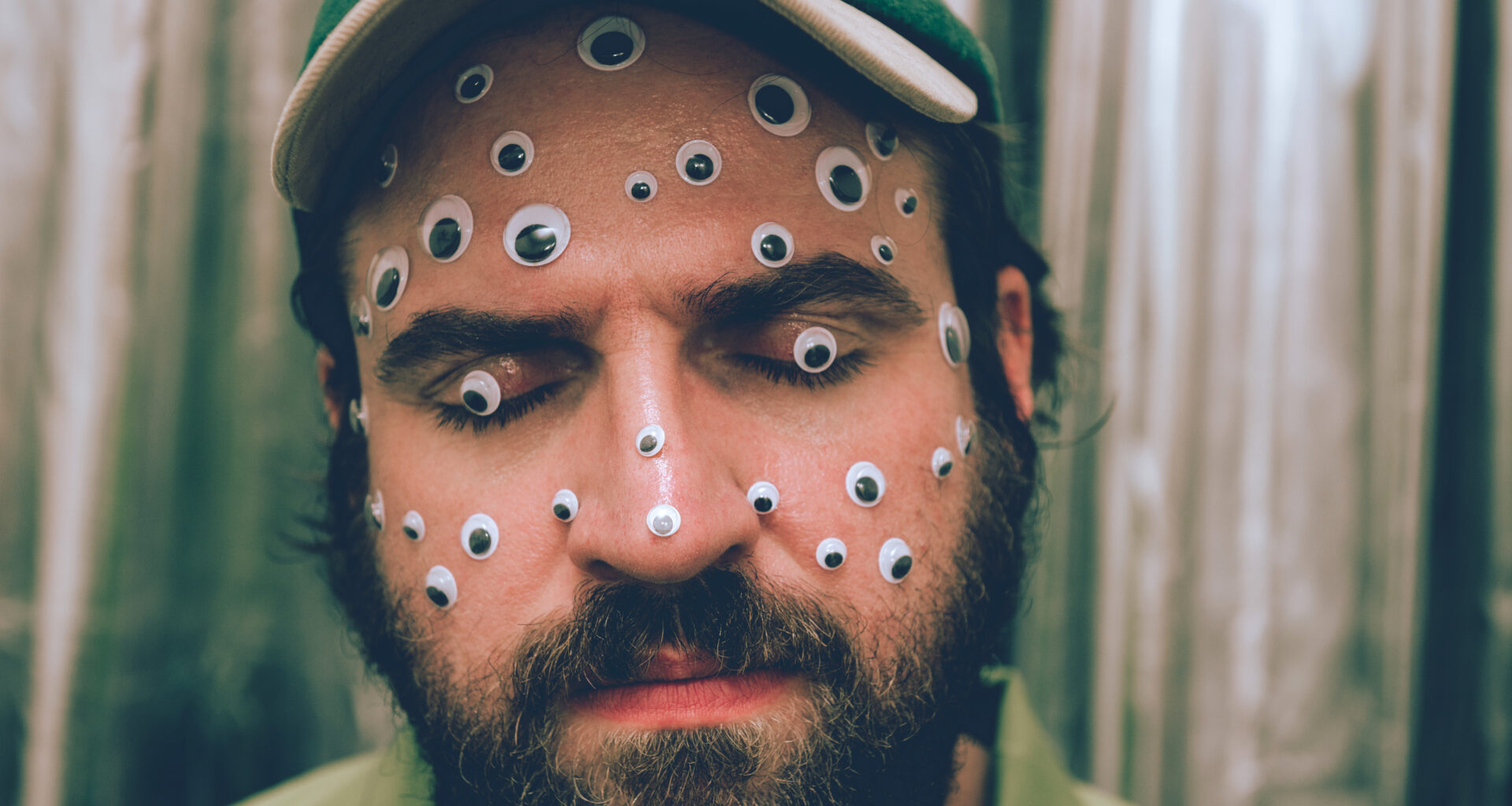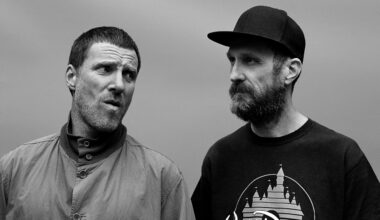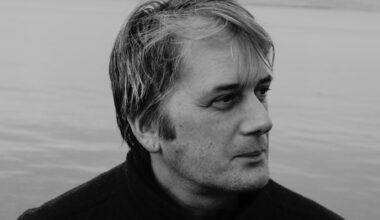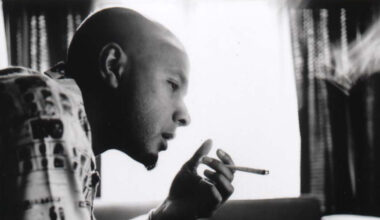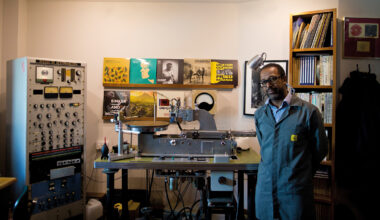From his studio on a remote Scottish isle, Johnny Lynch is channelling The Beta Band and serving up his very own life-affirming lo-fi pop as The Pictish Trail
“I had a genuine ‘High Fidelity’ moment with The Beta Band,” says Johnny Lynch, aka The Pictish Trail, remembering his teenage years living in Connecticut, hanging out in Bridgeport’s Secret Sounds record shop and listening to music that reminded him of his native Scotland. “I was in the shop and they came on, and I was like, ‘Wow, what’s this?’. I fell in love with that collage of sound. You could hear the electronic influence, the hip hop influence, the baggy indie thing, the psychedelic thing, it was such a patchwork, such a glorious mess. I pined for home.”
Now based on the Hebridean Isle of Eigg off Scotland’s rugged west coast, Lynch has come full circle with two Pictish Trail albums released on Fire Records in the last half-decade. Both 2016’s ‘Future Echoes’ and the recently released ‘Thumb World’ beautifully evoke the off-kilter, analogue electronic pop spirit of the long-since-disbanded Betas.
“I think there’s an expectation with electronic artists that you have to know everything about your kit outside of the presets,” he says, explaining his DIY approach. “I’m much more about getting some cheap electronics, plugging them in and putting them through the distortion pedal until I find a sound I like. A huge part of my musical upbringing has been bands like Erasure and Depeche Mode. Even if I was once part of what was considered quite a folky collective, my foundation in writing songs was based in Vince Clarke’s music.”
Lynch’s path crossed with his heroes The Beta Band in the Kingdom of Fife, where he and Kenny “King Creosote” Anderson had an ill-starred partnership as label bosses of cult DIY collective Fence, famed for their wild music festivals in the fishing village of Anstruther and prolific CD-R release schedule. Fence was picking up real traction – Anderson was Mercury-nominated for the 2011 folktronica classic ‘Diamond Mine’, co-created with Jon Hopkins, but his frustration with the demands of the mainstream music industry caused a permanent and acrimonious rupture in his relationship with Lynch in 2013.
During the partnership, Lynch ran the events and label side of Fence, while Anderson was putting on local nights, which were almost acting in competition.
“He was constantly about separating. I think he just wanted to have his own thing,” recalls Lynch. “He dealt with it in a bad way, but at the same time, thank God it happened. I wouldn’t have been able to have any sort of direction or motivation otherwise, as I’d be constantly worrying about what Kenny wanted.”
Following the spilt, Lynch moved his label and festival operations to his new Eigg-based Lost Map imprint, which has released records by Rozi Plain, the now Domino-signed Seamus Fogarty, Franz Ferdinand side-project Manuela, Ed Dowie of Brothers In Sound, and many others. It also allowed his own songwriting to flourish. Since The Pictish Trail’s sublime ‘Future Echoes’ in 2016 (released on Lost Map and then reissued on Fire at the request of the label’s head James Nicholls), he’s seeing much of the deserved attention that eluded his first two albums proper, 2008’s ‘Secret Soundz Vol 1’ and 2012’s ‘Vol 2’, whose titles recall that formative record store on the other side of the Atlantic.
On ‘Thumb World’, his naturally dreamy, elegiac vocal occasionally slips into an excited Jimmy Somerville falsetto, while the music bears hints of Tangerine Dream, Radiohead, The Beta Band (of course), Vince Clarke and, in the hypnotic, club-ready groove ‘Turning Back’, Jon Hopkins’ more dancefloor-friendly material.
“It’s got a much fuller sound to it,” says Lynch of the new record over a Monday morning coffee in Edinburgh. “I was thinking about things like sub bass. A lot of my earlier work was quite lo-fi out of necessity, but after working with producers with very nice studio set-ups, I’ve been able to create something with much more depth, which sounds good on a large sound system.”
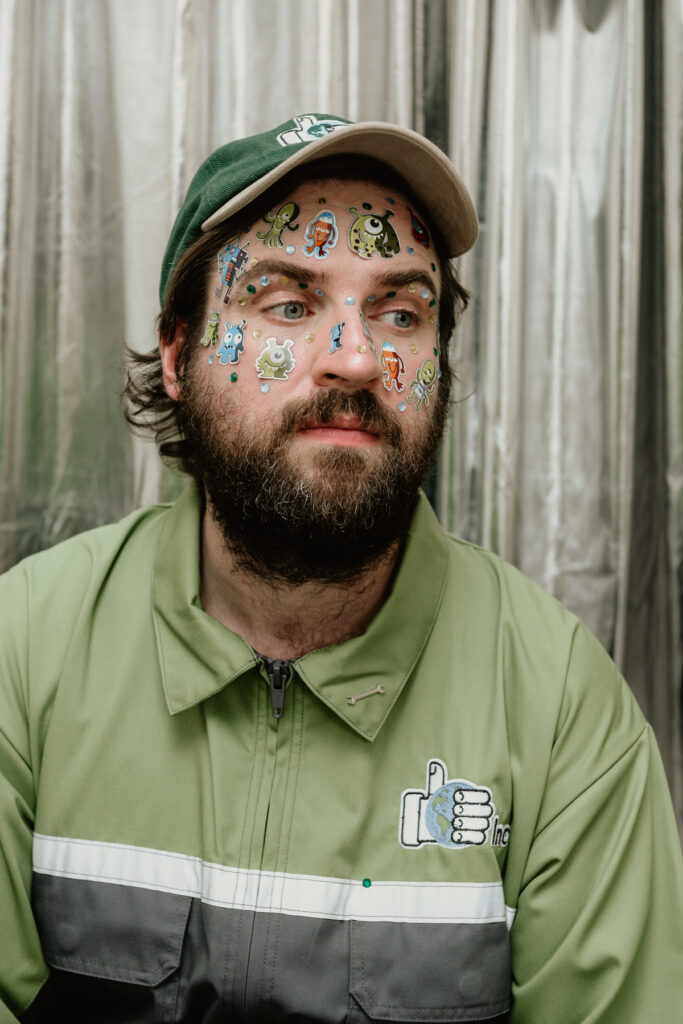
Born in Edinburgh, Lynch lived in Connecticut with his family from the age of 12 to 18, returning home to Scotland as soon as he was old enough. His choice of university (St Andrews, where he studied English Literature) was informed by the town being the spiritual home of The Beta Band themselves. Hailing from the Fife coast, the electronic psych-rock adventurers’ first album, 1998’s ‘The Three EP’s’, was not only evangelised by John Cusack’s character in the film ‘High Fidelity’, but it briefly threatened to make them the next Radiohead.
“They were already massive stars by the time I went to St Andrews,” says Lynch. “It was around the time of their first proper album, about which they’d said in interviews, ‘It’s shite, don’t listen to it’. I thought, ‘That’s punk rock!’.”
Lynch wasted little time making his mark at university and soon found himself DJing at student union club nights.
“They were run by this guy, I kid you not, called Stone Roses, or that’s what everybody called him. The music was very indie, but I was into The Beta Band, Aphex Twin, Squarepusher and Scott 4.”
He also dabbled with character comedy, influenced by the likes of Reeves and Mortimer and was part of a duo called Ministers Of Satan who played the Edinburgh Fringe.
“St Andrews is a small place, and it’s got a reputation for being quite posh with lots of American students,” he says, “but there are tons of bars and little halls where you can put events on, and because there’s nothing else happening, you have a captive audience.”
Lynch found his musical people at local record store CD Outlet, where he befriended the owners, Kenny Anderson and his friend Jason. He also became friends with Kenny’s brother, Gordon (aka Lone Pigeon), a pre-fame Beta Band member. Anderson was already releasing his own music through the shop, which soon changed its name to Fence.
“I spent hours in there, and saw they had their own CDs up on the racks next to Red Hot Chili Peppers or whatever,” says Lynch. “That’s where my musical education came from, being a fan and then realising I could make music myself.”
Clearly, it was this music that inspired him more than the big names.
“It was about creating stuff at home in a primitive way, about not having proper samplers, so using delay pedals to capture little seven-second loops, which was as much as you could loop on a delay pedal.”
He decided to join in himself, releasing his self-titled Pictish Trail CD-R debut album in 2002.
“It was very lo-fi, using a crappy synth, an acoustic guitar and one microphone. I did it at home and Kenny released it on CD-R. It sold in the 10s. We did printed artwork for it, and it got reviews. Laurence Bell from Domino compared it to Lou Barlow. I was like, ‘Holy shit!’.
“Within a year I was meeting all these people and playing in a band called UNPOC, who were part of Domino at that point. One of our first shows was in Sweden where the record had gone massive. We played in front of 10,000 people, although I had nothing to do with that aside from backing vocals and tambourine. That happened within a year of sending stuff into Fence, from my bedroom to 10,000 people…”
As things progressed, Lynch began running the Homegame festival in Anstruther and met the wider Fife music family, including The Beta Band’s Steve Mason (who he supported on tour last year) and John Maclean, and the latter’s brother, Dave, later of Django Django.
“It was really inspiring being part of a scene where being prolific was admired more than being perfect,” he says. “A lot of that music hasn’t dated well, but it inspired and created a scene, which was pretty amazing.”
A musical step-change occurred in 2009 when Lynch worked on a club-focused side project Silver Columns with producer Adem Ilhan, which yielded the underrated album ‘Yes, And Dance’ on Moshi Moshi.
“Adem’s good pals with a lot of people on the electronic scene,” says Lynch. “He was in Fridge with Four Tet, he’s best mates with Caribou, he went to school with the Hot Chip lot, so he wanted to dip his toes in.”
Lynch travelled to London with “some crappy keyboards, a drum machine and some pedals”, and the pair set to work.
“I think he felt it was going to sound liberatingly fun and pop,” says Lynch, “which is what’s always intrigued me about Vince Clarke – the sound he created with Depeche Mode and then Erasure was the sound of him trying to create a rock band, but using only electronic elements, and there’s something really primal about that.
“Silver Columns made me realise I didn’t need a complete idea to start a song. You can begin with a fragment, even just a sound you like filtered through something, then add a beat to it. It’s like a jigsaw puzzle, you think about how dance records are created, how there’s a build to it as opposed to the traditional folky thing where it’s verse-chorus-verse. That’s something I’ve carried with me, certainly with ‘Future Echoes’ and ‘Thumb World’.”
Although Lynch has a full band for touring purposes (which now includes Super Furry Animals’ bassist Guto Pryce, a recent émigré to Fife), The Pictish Trail’s albums are solo affairs, pieced together in the studio with producers Ilhan and Rob Jones.
“Moving to Eigg has had a massive influence on my writing,” he says. “The journey to get there was so long, it’s like removing yourself from normal life. There’s so much space to be alone with your thoughts, particularly in the winter when not many boats travel. A lot of my writing comes from taking long walks and allowing my mind to relax. It’s just me recording voice memos of little refrains or lyrics on my phone, and then trying to transpose them to a drum machine or a synthesiser later.
“The song ‘Thumb World’ itself is centred around the visual image of two astronauts having sex in space and one covering the Earth with their thumb,” he explains, with a wry laugh. “Kind of stupid, but it’s also about being addicted to our screens. I’m as guilty as anyone of being a slave to my phone, although it’s become apparent that we’re immersed in an unending news timeline within a weird echo chamber. You’re looking at your fucking phone and the world is falling apart! The record is about all that, but musically it’s about having fun and trying to escape.”
Get the print magazine bundled with limited edition, exclusive vinyl releases

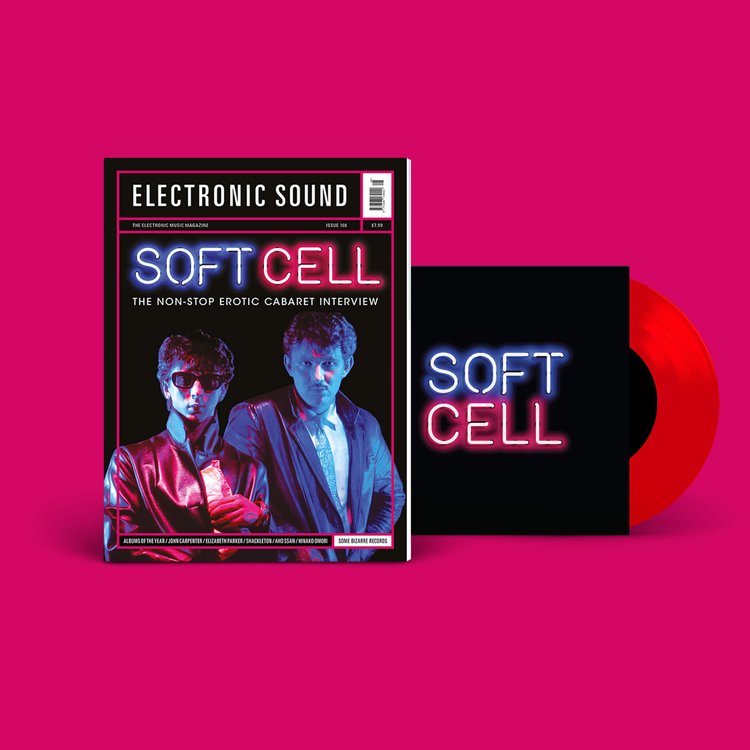
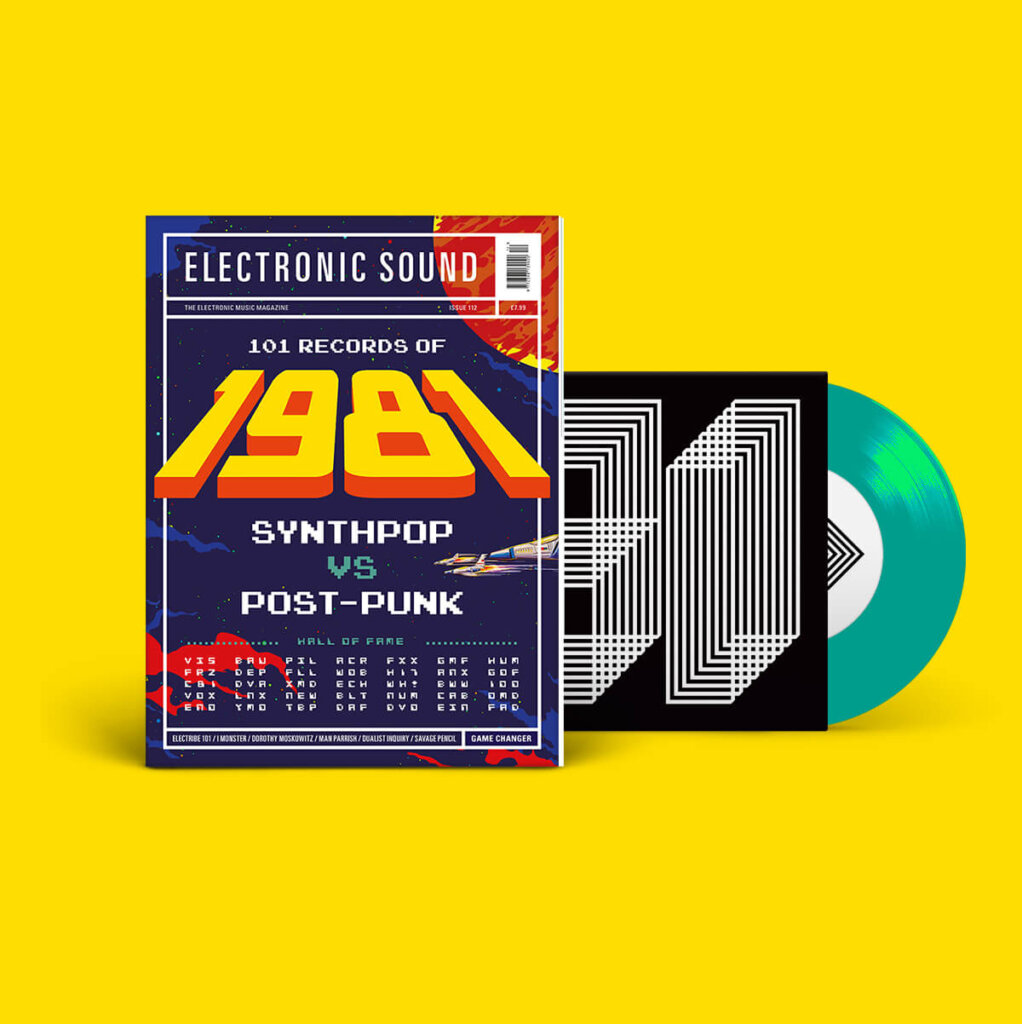
With our coffees drained, Lynch returns to his love of the work of Vince Clarke, as well as other favourites including Boards Of Canada, Aphex Twin’s ‘Selected Ambient Works’ and the Border Community label.
“Electronic music is founded on trying to belong to a certain sound and immersing yourself in that culture, isn’t it?” he ponders. “That’s why a lot of producers use a similar suite of sounds that exists across genres; they have a thread that runs throughout. It’s how you create that world. It’s why a lot of music created in the 1980s is still so listenable, whereas a lot of conventionally recorded pop from that era just isn’t.
“The first four Erasure albums still blow my mind. I was listening to ‘The Circus’ a month ago and just hearing the intimacy, how close everything sounds, all right to the front. It’s beautiful. Vince Clarke is amazing. On the earlier Depeche Mode recordings, everything is so pristine and so separate, and you can hear every single element. Then with Erasure specifically, when they bring in an element that’s from a more conventional band set-up, like an acoustic guitar, it really punches in the heart.”
We try to define that sense of timeless futurism and nostalgia, which co-exist in the best electronic music.
“It tugs at the heartstrings, doesn’t it?” he sighs. “It’s just really warm and emotional. There was a vision of the future back then that was hopeful, whereas now any vision of the future is quite dystopian, so people yearn for that golden age of pop music. I mean, what’s the pop music being made now that lets you yearn for a better future?”
Well, there’s always The Pictish Trail – on which Fire have an option for another album if ‘Thumb World’ goes well. It’s worth remembering, however, that a lot of these halcyon electronic memories were of songs forged under the shadow of the bomb.
“Oh my God, yeah,” he exclaims. “The euphoria of listening to ‘Two Tribes’ as a kid. Maybe that’s what I need to go to next… nuclear holocaust records! Let’s see where that goes.”
Then he’s off, into the future.
‘Thumb World’ is out now on Fire
